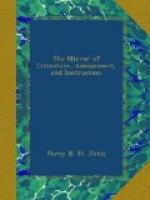“I can hardly judge at present, but I don’t think Arlington’s suit will prosper, and you will laugh when I tell you why: it is not that the youth is too shy and the maiden too cold; it is not the officiousness of the Berwicks;—it is because Lord Arlington has some thirty or forty thousand a-year. He is so rich, and the Rochdales so poor, and so stiffly disinterested withal; and it is such a mortal sin to think of money in this dirty world, where we cannot live without it, that they actually discourage him, and make it a point of honour to snub him daily, to prove their superiority to mercenary considerations. What weak things your strong-minded people sometimes do! and what horrors arise from acting upon principle! I, who have none, fancy I sometimes stumble into right by just doing what I please, and letting others do the same.
“Pray be bountiful, and send me some news, true or false—only if the latter, tell me the inventors. I have had nothing of the kind save a letter from Neville, full of comfortable lies, which I have already re-told, and now dearth is staring us in the face—not five minutes consumption in the house—and we are reduced to talk about each other, Berwick excepted, who falls back upon himself, and tells one again and again the ‘very good thing’ he said ten years ago. Tell me something about your intimates—what are their high mightinesses, Ladies Crawford and Cheadle, now doing for the edification of the world? Has the former forgiven his Majesty of ——? or is she brouillee with any other potentate! Has the latter made peace with the Cabinet? or are Ministers still doomed to exclusion from her parties unless they will be good boys, and do as she bids them? and is she still chattering party gossip, and thinks all the while she is talking politics? Send me our dear friend’s last silly thing; and if you don’t know which is the last, do, pray do, go to her house and gather one.
“I know nothing of Beauchamp but that he is now in Scotland, chin-deep in heather, killing grouse against time for a bet of some hundreds, which he has persuaded some simpleton to make with him. No man knows better than Beauchamp how to get paid for amusing himself. I had never heard, and don’t believe, that Beauchamp is going to take a wife. Whatever you know of this, pray tell me; and say whose wife—not Sir Robert Ridware’s, I hope; that would be so illiberal, and so unnecessary! I hate monopolies; and, moreover, I have always admired, the example of the poet Thomson, who ate his peaches off the tree. Forgive this pedantry, and any other sins in my letter; or if you are to scold me, let it be in person. Addio! fair lady. Yours,—not unalterably, for that is tiresome,—but as long as it pleaseth you.
“G.D.”
A pleasant anecdote follows, by Sir James Berwick, “a busy, meddling, vain, good-humoured man, whose chief ambition it was to be considered thoroughly ‘a man of the world,’ and ‘a good member of society.’”




